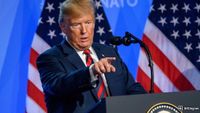The crypto community claims that the jaw-dropping premium was caused by market makers leaving the crypto exchange.
Binance.US sees a whopping $650 premium on its BTC/USD trading pair compared to Coinbase and Binance's BTC/USDT pair, raising eyebrows among crypto enthusiasts.
According to the charting platform TradingView data, this disparity had grown significantly since the end of April, when it was only around $20.

Did you know?
Want to get smarter & wealthier with crypto?
Subscribe - We publish new crypto explainer videos every week!
What is Polkadot in Crypto? (DOT Animated Explainer)


The premium on Binance.US may be due to market makers, who provide liquidity to the order book, exiting the crypto exchange in anticipation of potential regulatory action. This observation comes from Twitter-based analyst Fewseethis.
Binance.US has been under the scrutiny of the US Securities and Exchange Commission (SEC) since February, with the SEC accusing the platform of operating an unregistered securities exchange in the US.
A volatility trader from crypto asset management firm Blofin, Griffin Ardern, claims that the imbalance in Binance.US' order book, with more buy orders than sell orders, could be a sign of weak market depth and the departure of market makers.
On Binance.US, the order book is imbalanced with significantly more buy orders than sell orders. For a giant exchange, such a depth chart is undoubtedly abnormal. Prime market makers are leaving Binance.US, possibly due to regulatory pressure and renewed compliance requirements.
On top of that, on May 8th, Tether (USDT) surged to $1.3 on Binance.US, deviating from its dollar peg.
While the reason for Tether's appreciation remains unclear, some, including popular pseudonymous trader Byzantine General and crypto exchange OPNX's market maker Alice, believe the premium signifies fiat withdrawal problems at the crypto exchange.
Binance.US has recently caught the attention of crypto enthusiasts as it terminated its $1 billion asset acquisition deal with bankrupt crypto brokerage Voyager Digital, citing "the hostile and uncertain regulatory climate in the United States."






















